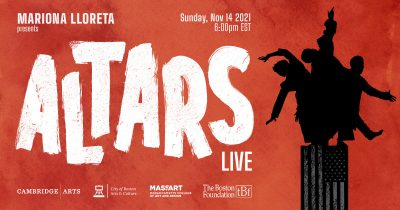People gathered on Zoom to experience ALTARS Live — a virtual event showcasing BIPOC artists around Boston as well as the premiere of Mariona Lloreta’s newest film, “Altars” on Sunday, Nov. 14.

The premiere event featured musicians and other performers that aimed to create a conversation about racial justice in Boston and the United States, which the film also highlights. “Altars,” an experimental film commissioned by the City of Boston and City of Cambridge, focuses on police brutality and racial justice in Boston and the country at large.
The event kicked off with multidisciplinary performances from Boston Grammy-nominated saxophonist Phillip Young, Boston’s Youth Poet Laureate Alondra Bobadilla, Boston Ballet company member My’Kal Stromile and Season 6 winner of “So You Think You Can Dance” Russell Ferguson.
Young, a professional multi-instrumental musician, performed Sam Cooke’s 1964 “A Change is Gonna Come” on his saxophone.
“The talent was amazing,” Young said. “I’m speechless from what I’ve seen and witnessed from the other artists. I’m just incredibly honored to be a part of this project.”
Bobadilla, a student at the University of Massachusetts Boston, recited the poem “Highest Praises” at ALTARS Live. She said she found it interesting to be able to see what the other performers presented.
“[Lloreta] gave me a general scoop,” Bobadilla said. “But that general topic can go into so many different, hyper-specific topics. I felt like my piece was more centered and more focused on something specific. It was like a branch from the tree of the main focus of the film.”
Following the performances, “Altars” premiered. The film centers around a couple who are due to have a baby.
Lloreta, the director, writer and producer, said “Altars” has been “brewing for many years.” Inspired by conversations with her fiance, in addition to “unpleasant, uncalled for instances,” with police they’d experienced. Lloreta said she wanted to capture that feeling of not knowing whether or not her fiance, who is Black, will return home.
“Every time my fiance gets out of the door, it could be the last time I see him, and it will actually have nothing to do with how he carries himself out in the world,” Lloreta said. “There’s so much love yet so much fragility as a family unit.”
Lloreta wanted to try and convey this idea through empathy, she said.
“The film basically appeals to our humanity and our emotions,” she said at the event, “and you just have to feel it and experience it, basically in hopes to come closer to what this family in the film might feel.”
Lloreta, a Barcelona native who has lived in the United States for 13 years, grew up in a family of artists. She’s traveled across the country and flown internationally to places like Nigeria to film. Now, Lloreta lives in Boston and also teaches screenwriting classes at Emerson College.
From the start, Lloreta had a clear vision, and Director of Photography Sara Robin said at the event she wanted to hone in on the locations and costume design.
“I kept telling her [Lloreta], ‘The camera is not that important. We’ll figure out the light. We need to nail the production design,’” she said during the Question and Answer session of the live event.
The film was produced by an all-female identifying crew, which, as actor Kimaya Diggs said, created a particularly comfortable environment. This was an intentional choice, as the film industry is dominated by white cis-gendered males, Lloreta said.
The film also differed from other Black narratives in its tone, Diggs said.
“A lot of what we see when non-Black people are making Black narratives is like trauma porn, something that is supposed to shock us,” Diggs said at the event. “This is a lot more gentle, and honestly the gentleness makes it more approachable. The ultimate impact I felt was really, really strong.”
Now that the film has premiered, “Altars” will circulate through film festivals. The film will possibly be available at local in-person screenings in and around Boston.
“It’s so incredibly fulfilling and there’s nothing like it when you see the actual film come to life,” Lloreta said in the interview. “It’s just the product of a collaboration among so many creatives. The process of bringing an idea to life to me is so rewarding.”
























































































































